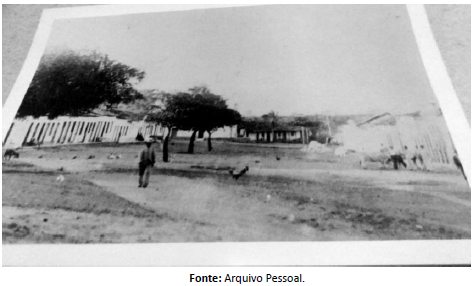Questões de Concurso
Comentadas para prefeitura de arapiraca - al
Foram encontradas 236 questões
Resolva questões gratuitamente!
Junte-se a mais de 4 milhões de concurseiros!
Leia o excerto e observe a foto abaixo e em seguida faça o que se pede.
Excerto -
“O desmatamento que (…) fez ao lado da Arapiraca, para plantar sua primeira roça, tinha a dimensão de um quadro (medida tradicional) com formato retangular. E foi, exatamente, com a forma desse quadro, que teve início o arruado de casas de taipa de duas águas.
Quando o povo de outra região se dirigia para a nova localidade,anunciava que ia para o ‘Quadro de Arapiraca’. Essa foi a primeira denominação dada pelo povo à primeira rua do lugarejo que, ainda hoje, tem o nome de Praça Manoel André. (…).
Muitos anos depois da Emancipação de Arapiraca, os habitantes do ‘Quadro’ ainda eram, todos, remanescentes do pioneiro Manoel André."
(Guedes, Zezito. Arapiraca através do tempo. Maceió: Gráfica Mastergraphy Ltda, 1999, p.27.)

Com relação ao excerto e à foto acima, marque nas alternativas abaixo “V” para verdadeiro e “F” para falso.
I - O excerto relata, dentre outros fatores, um dos momentos da vida de Manoel André, que chegou as terras de Arapiraca nas primeiras décadas da Républica no Brasil, como se pode deduzir pela foto. ( )
II - O excerto comenta que ainda havia entre os “habitantes do ‘quadro’” descendentes de Manoel andré depois da emancipação do povoado, ou seja, quando o Brasil já era uma República Federativa. ( )
III - A foto se refere à imagem do povoado de Arapiraca em 1910 (ou seja, vinte anos após a morte de Manoel André) que, atualmente, faz parte da exposição permanente do museu Zezito Guedes. ( )
IV - O excerto faz referência à fundação de Arapiraca em 1848 e a foto, disponível no livro “Arapiraca através do tempo” de Zezito Guedes, retrata o bairro Alto do Cruzeiro em 1950 tendo ao fundo a igreja. ( )
V - O excerto conta a história do “quadro de Arapiraca” e sua relação com a família de Manoel André, do período monarquista escravocrata até o republicano no Brasil e a foto retrata o ainda “povoado de Arapiraca” no início da República. ( )
Qual das alternativas abaixo apresenta a sequência CORRETA de afirmações verdadeiras ou falsas:
Atenção: Leia o texto abaixo para responder a questão.
UM APÓLOGO

Machado de Assis. Disponível em: http://contobrasileiro.com.br/um-apologo-conto-de-machado-de-assis/ Acessado em 29/03/2019
De acordo com o texto “O Apólogo” de Machado de Assis e com a ilustração abaixo, e levando em consideração as personagens presentes nas narrativas tanto verbal quanto visual, indique a opção em que a fala não é compatível com a associação entre os elementos dos textos:

Observe a foto abaixo e, em seguida, faça o que se pede:

Fonte: Internet. Disponível em: http://web.arapiraca.al.gov.br/feira-livre/ Acessado em 10/03/2019
A foto acima, refere-se a:
ATENÇÃO: Leia o texto abaixo para responder as questão.
ANEDOTA
Um músico mambembe resolve ganhar algum dinheiro tocando sanfona no meio da praça. Aparece um fiscal e o interrompe:
– Você tem licença?
– Não.
– Então me acompanhe.
– Claro. E que música o senhor vai cantar?
Brasil: almanaque de cultura popular. São Paulo, n. 97, maio 2007.
Choose the correct alternative:
1. For English speakers, Spanish is easier than Russian.
2. In the U.S. the average height for 17-year-old girls is 166,5 cm; for boys it’s 179,7 cm. At that age, girls are usually shorter than boys.
3. Mars is farther from the sun than the earth is, so its temperature is much lower. Mars is hotter than the earth.
4. Diamonds are beautiful, but they are also very hard. In fact, they are the hardest things found in nature.
5. John F. Kennedy was only 43 years old when he was elected president. He was the younger man ever elected president of the U.S.
True or False?
Choose the best alternative:
The teacher asked them how long they had been studying English.
Romeo and Juliet by Shakespeare.
1. If Romeo had met the messenger, he killed himself.
2. If Juliet hadn’t killed herself, Romeo wouldn’t have killed himself either.
3. If Romeo’s and Juliet’s families hadn’t been enemies, they would have gotten married.
4. If Romeo had met the messenger, he wouldn’t have killed himself.
5. If Shakespeare hadn’t been born, he would never have written Romeo and Juliet.
True or False?
Use the right words to complete the sentences, but, when, where, and, then:
1. This is the house…………….. I live in.
2. Learning a foreign language is important ……………..it can help you find a good job.
3. I usually go to the beach …………………. I'm very stressed.
4. The weather is wonderful, ………………… we can go to the beach.
5. I like wine …………………I don't like beer.
Choose the correct alternative:
Choose the correct alternative to complete the sentences:
“I don’t think that red blouse really goes…………..your orange skirt, dear.”
“What a fascinating story. Do go ……….!”
“There’s an awful influenza virus going……………. . I hope you don’t catch it.”
“Did you know that a camel can go…………….water for thirty days?”
“One by one, the street lights went……………., leaving us in total darkness.”
True or False?
1. brought about (2nd paragraph) means fez surgir. 2. turns me on (4th paragraph) means me interessa. 3. issue (4th paragraph) means item. 4. The author's excellent approach (4th paragraph) means o autor tem uma ótima aprovação. 5. a classic work by itself (4th paragraph) means um clássico por si só.
Choose the correct alternative:
The author: